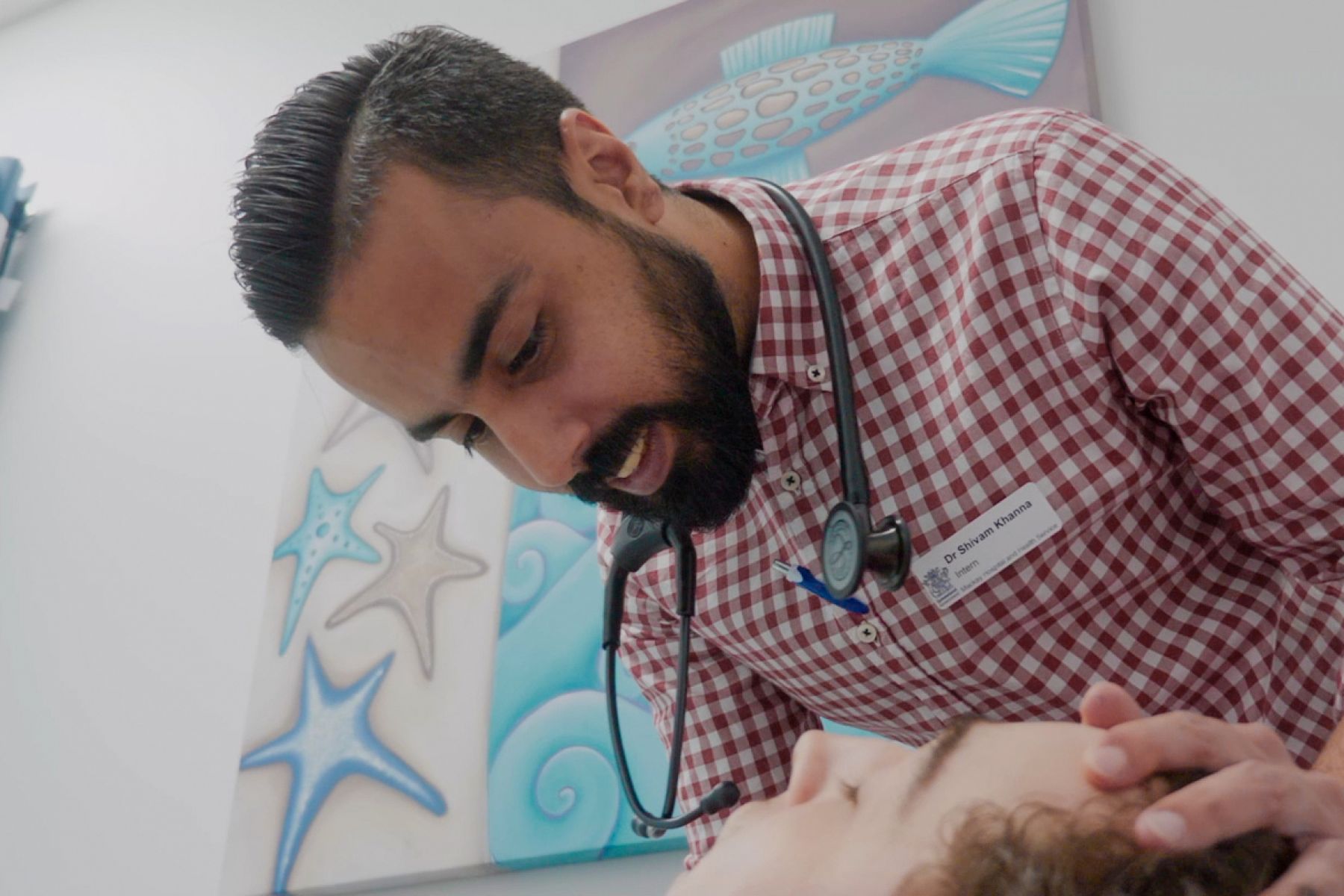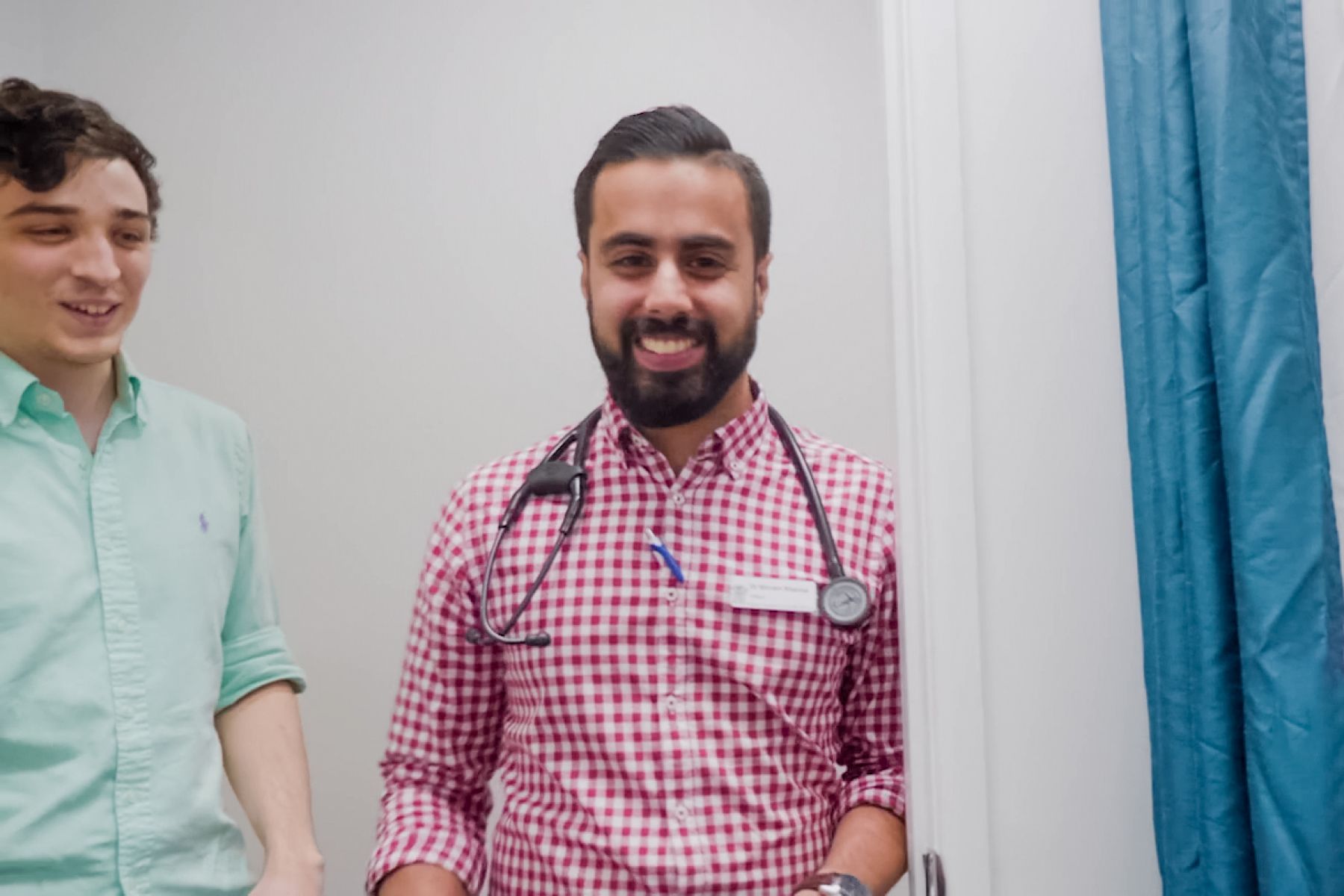7 June 2021
A global journey from Kenya to Mackay for international intern

Originally hailing from Kenya, relocating to Canada and then to North Queensland, JCU medical graduate Dr Shivam Khanna has undertaken a journey across the globe in his quest to become a rural generalist doctor.
“I grew up in Nairobi, Kenya and then went to pursue an undergraduate degree in sciences in Canada. About midway through my degree I realised that I actually wanted to do medicine. I really enjoyed studying human physiology and anatomy and I’ve wanted to help people.
“Having grown up in Kenya, I had a particular interest in rural and tropical medicine so I did some research on where best to study this and James Cook University came up, so I applied to study there and the rest is history!”
For the first year of his internship, Dr Khanna moved to the rural town of Mackay, located on the Coral Sea coast in North Queensland’s Whitsundays Region.
“I chose go to Mackay for my final two years of medical school as I'd heard great things about the hospital there. I wanted an environment where there were small teams and where medical students could get really involved in patient care. And then I decided to stay on and do my internship there as well.”
Located at Mackay Base Hospital for two years of his internship, Dr Khanna has since completed rotation in anaesthetics, orthopaedics, general medicine and general practice (GP).
“They’ve all been very different rotations with diverse presentations of patients. But for all of my rotations, I was part of a small team consisting of either a consultant, registrar, or resident doctor and myself. So you are able to get lots of hands-on experience and in the process learn a lot about how medicine is actually practiced.
“Anaesthetics was a really good rotation to start off with, as you learn a lot of practical skills such as airway management and cannulation skills, which set me up well for the rest of my internship in general medicine.
“Being in anaesthetics also meant my job was pretty much on the frontline, in that you need to observe if anything goes wrong with the patient and to manage that. Although of course you also need to be able to recognize your limitations and when to escalate a situation to a supervisor, registrar or consultant.
“It’s a very well-supported rotation as there's a consultant with you most of the time right next to you, giving advice, and you're learning from their experiences. So it’s a very safe environment for you to take that next step and challenge yourself.”
Reflecting back on his internship experiences at Mackay Hospital, Dr Khanna says it was the uniquely regional nature of the hospital that had a positive and dramatic impact on his learning journey.
“Being in a regional hospital means there are less sub-specialties and more opportunities for general medicine instead. Which means you have more opportunity to ‘step up’ as a junior doctor."
“In a large hospital, for example, a case of pneumonia might go to a respiratory physician or the respiratory team, whereas in a regional hospital like Mackay you end up getting a good exposure to a whole variety of different presentations that would normally only be managed by sub-specialised teams.”
The friendly workplace culture of the Mackay Hospital was also a standout feature.
“You quickly get to know the nursing staff, the pharmacist, and the allied health team of speech pathologists, physiotherapists and occupational therapists. You get to learn how each other work as you build a relationship based around the patient’s care.
“Everyone's really friendly because you work in such close proximity to each other. There’s never been a case where I've asked for help and it hasn't been available. I feel like the culture is such that people want to help you, and that you just have to ask for it.”
Another important ingredient of the medical training in Mackay Dr Khanna experienced was the quality of supervision he received throughout his internship there.
“I have found the supervisors in the Medical Education Unit to be extremely approachable. You're always being encouraged to learn more and to make the next step. You feel safe to practice what you can because you know that they are nearby and ready to help you.
“You also have the opportunity to really get to know your consultant and your registrar and they also get to really know you which helps to set the foundation for trust. You are then able to gain better exposure and experience through that trust.
“Working in a safe environment with this kind of support has benefited me greatly because I've been able to take that next step.”
The supportive nature of supervision was also evident on ward-based rotations, such as orthopaedics.
“For the orthopaedics rotation I was mostly involved in managing pre-operative and post-operative patients. So it's often managing their pain, managing their nausea, and managing any other comorbidities they might have.
“But it’s also important to recognise any surgical complications that may arise and escalate those to your registrar or to the consultant. Fortunately, there is always someone available to help when you need it. It’s great knowing that someone has your back.”
Overall, it was the team-based nature of working in the hospital that Dr Khanna regards as one of the best learning experiences of his internship at Mackay.
“I learned a lot about teamwork. You’ve got a consultant, your registrar, a resident doctor who's maybe two or three years out, and yourself. And so you learn how to coordinate your own work and see how it might be related to someone else's job. And you get to see how if you can do that part of your job, it allows them to do their job as well.”
As part of his one-year internship spent at Mackay Hospital, Dr Khanna also completed a rotation in General Practice.
“The GP rotation was completely different to the hospital-based rotations. It's a different sort of thinking game because you have to work from the start to come up with a diagnosis. And then you have to decide if they are safe to be managed at home or whether you need to send them to hospital or to refer to a specialist.
“From this rotation I learned a lot in terms of clinical reasoning and just practical skills, which helped to build my confidence as a medical practitioner.”
In addition to the lifestyle benefits of the North Queensland region, Dr Khanna has also enjoyed the exposure to tropical medicine that the region offers.
“We recently had a gentleman who came in with a fever of unknown origin. Thankfully, he made a full recovery even though we actually never found the source of his illness. As a doctor, it was both weird and wonderful because you had to consider a range of uncommon tropical diseases that you probably would not come across if you were working in a city hospital.”
“And of course, being in Mackay means I get to explore a beautiful area. There are gorges to hike and interns get to live right next to Airlie Beach, which is a popular holiday spot and so has a lot of restaurants to choose from. Then there are the Whitsunday Islands, and also plenty of beautiful beaches close by like Hideaway Bay. There's plenty to do in the region and it’s a good environment to relax.”
After completing his year at Mackay, Dr Khanna’s next rotation in Emergency Medicine was undertaken in the small nearby town of Proserpine where he again received valuable frontline experience.
“When I was at the Proserpine Emergency Department (ED), as the junior doctor I was fortunate to have opportunities to perform rapid assessments for patients coming into ED and manage the patient emergently (with support on-hand). Contrast this to ED in larger hospitals, where the consultants and senior registrars will usually stabilise the patient before the juniors even have a chance to see them.
“I also had heaps of interaction with retrieval medicine. Once we had stabilized unwell patients who needed further specialised management, we would have to help arrange and prepare them for transport. This opened my eyes to the world of retrieval medicine and how interesting it is.
Dr Khanna has since decided to specialise in emergency medicine and is currently an ACEM (Australian College of Emergency Medicine) trainee, with interests including paediatrics and retrieval medicine.
“At Proserpine ED, I was exposed to unwell children and was able to have a key role in managing them. I also experienced retrieval medicine on the receiving end which has intrigued me as a field to possibly follow in the future.
“Because of the way you are guided and supported, but also given autonomy to practice and learn, I was able to step up and grow during my time at both Mackay and Proserpine hospitals. It’s what rural and regional hospitals do best.”

Find out more about Rural Generalist training
> Entry requirements
> Training Time
> How to apply
> Download pathway guide
NQRTH is an initiative of the Australian Government's Integrated Rural Training Pipeline (IRTP) and is facilitated by James Cook University in partnership with public and private hospitals, Queensland Aboriginal and Islander Health Council (QAIHC), health services, Aboriginal Community Controlled Health Organisations (ACCHOs) and GP clinics.
Cairns region
(07) 4226 7138
Central West region
(07) 4764 1547
Mackay region
(07) 4885 7122
North West region
(07) 4764 1547
Torres and Cape region
(07) 4095 6103
Townsville region
(07) 4781 3424








